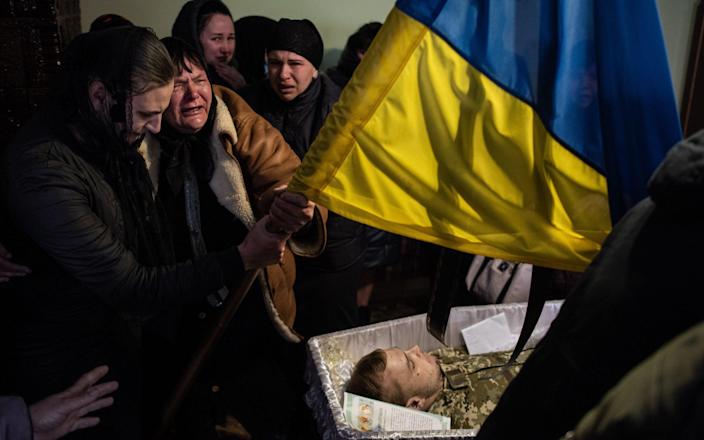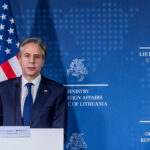
When Vladimir Putin launched his war with Ukraine, he said he was doing so to “de-Nazify” the country – questioning its right to exist.
Only last week, the Russian president had accused the country’s leadership – including Volodymyr Zelensky, its Jewish prime minister – of being a “band of drug addicts and neo-Nazis”.
On Monday, Dmitry Peskov, the Kremlin’s chief spokesman, offered Moscow’s terms to halt the invasion. If the original plan had been to conquer the whole of Ukraine, the terms of the new deal represent a significant retreat.
After 12 days of fighting, Putin’s war is not going to plan. Russia has failed to capture Kyiv, its convoy in the north is bogged down and its troops are suffering major losses. It could still regroup, Western officials have cautioned, and there is strong progress in the south.
But Mr Peskov, who has served as Putin’s spokesman for more than 20 years, said Russia would stop fighting “in a moment” if Ukraine met its list of conditions.


Moscow may have decided, after economic sanctions that are crippling the country, that the war is better cut short and that now is the time to pursue a peace deal on its terms.
Or it may be a trap. Ukraine may be obliged to reject the deal and Russia may step up its bombardment, claiming it had no other choice. Below are Moscow’s demands:
Ukraine must cease fire
If the Kremlin had thought the might of the Russian military would knock off Ukraine in quick time, it was wrong.
Mr Peskov rowed back on any suggestion that Putin had been making territorial claims on Ukraine. He said it was “not true” that Russia was demanding the whole of Ukraine be handed over and put under Kremlin control.


In an interview with Reuters, Mr Peskov said: “We really are finishing the demilitarisation of Ukraine. We will finish it. But the main thing is that Ukraine ceases its military action. They should stop their military action and then no one will shoot.”
Ukraine has suffered terrible losses, with Russia targeting its densely populated urban areas. But only Kherson, of the major Ukraine cities, has fallen and in a country larger than France, Russia has made few inroads. The government in Kyiv is still standing and Russia has failed to achieve air superiority. Ukraine will be dismissive of a ceasefire with the preconditions dictated by Russia.
Anatol Lieven, senior fellow with the Quincy Institute for Responsible Statecraft and a visiting professor at the war studies department at King’s College London, questioned what Mr Peskov actually meant by “demilitarisation”.
He added: “If it means the abolition of the Ukrainian armed forces, then, of course, that’s completely unacceptable.” But if it meant the withdrawal of long-range missiles from its soil, similar to the agreement that brought the Cuban missile crisis to an end, then a deal, said Professor Lieven, might be doable.
Ukraine must turn its back on EU and Nato
Russia has long protested against any attempt by Ukraine to join either the Nato alliance or the European Union. It wants to make Ukraine’s neutrality a condition of any peace deal.
Mr Peskov told Reuters: “They should make amendments to the constitution according to which Ukraine would reject any aims to enter any bloc.
“Ukraine is an independent state that will live as it wants, but under conditions of neutrality.”


This appears to be a concession. In the days before the war, Putin had dismissed Ukraine as a Bolshevik creation. Now the Kremlin appears to be recognising Ukraine’s right to exist, but refusing its right to make treaties.
Shashank Joshi, a former senior research fellow at the think tank RUSI and now defence editor at the Economist, said: “So two weeks in, Russia has unilaterally moved down to: the Nazis can stay if they say no to Nato and hand over territory.” He added: “Were Ukraine to agree to such terms (not impossible), it would also have bad implications for other EU or Nato aspirants.”
Prof Lieven told Democracy Now a treaty of neutrality was not out of reach, pointing out Austria and Finland had stayed neutral during the Cold War – even though they were “in effect part of the West”.
Recognise Crimea
Russia illegally annexed the Crimea in 2014, claiming it was doing so to protect ethnic Russians living in the peninsula. Mr Peskov said on Monday: “We have also spoken about how they should recognise that Crimea is Russian territory.”


Mr Zelensky and the West have refused to recognise Russia’s annexation. But the reality is Russia will not hand back Crimea and Ukraine is never going to win it back in a war. This could well be a sticking point in any deal, but the West may wish to push Mr Zelensky into a deal to bring hostilities to a halt. Prof Lieven suggested the thorny issue could somehow be “shelved”.
Russia had accused Ukraine of “genocide”, largely over claims Kyiv was blocking water supply to the peninsula. If Moscow and Kyiv could come to some deal on Crimea – without Ukraine having to recognise it as a Russian territory – then perhaps Russia could argue it had secured Crimea’s survival and justify the invasion, thus saving face.
Recognise Donetsk and Luhansk as independent states
Parts of the Donetsk and Luhansk regions have been occupied by Russian separatists since 2014. Ukraine’s eastern border has seen intermittent fighting over the past eight years and now the Kremlin is demanding the two regions be recognised as independent countries, separate from Ukraine.
In the days before the war, Putin had recognised the Donetsk and Luhansk People’s Republics in a signing ceremony live on television that was a prelude to war. Mr Peskov said their recognition would need to be part of any peace deal.
“This is not us seizing Luhansk and Donetsk from Ukraine,” he said. “Donetsk and Luhansk don’t want to be part of Ukraine. But it doesn’t mean they should be destroyed as a result.”
Samuel Charap, a senior political scientist with the RAND Corporation, a US defence think tank, said on Twitter it was “hard to see” how President Zelensky could agree to the recognition of Donetsk and Luhansk:
Hard to see how @ZelenskyyUa could do any of these except #2. Frankly, the demands for recognition are effectively demands for total capitulation. Recognition of Crimea and DNR/LNR would only happen if there were a new govt installed.
— Samuel Charap (@scharap) March 7, 2022
Fate of Mr Zelensky
The Kremlin’s battle plan in the first days of the war had been to capture Hostomel airport close to Kyiv, land a crack team of special forces troops, drive to the capital, grab the president and, metaphorically at least, “decapitate” him.
But 12 days on, Mr Zelensky remains a hero of the Ukrainian people and now of the world.
[embedded content]
In his Reuters interview, Mr Peskov made no mention of Russia’s demands for Mr Zelensky.
However Christo Grozev – executive director of Bellingcat, an investigative journalism group that has exposed Russian wrongdoing for several years – said the Kremlin was now willing to accept Mr Zelensky as president, provided that Yuriy Boiko, a senior politician more sympathetic to Russia, is appointed as prime minister.
Mr Grozev tweeted:
Two persons close to the Russia-Ukraine negotiations (including back channel talks) tell me Russia proposed (1) Zelensky remains pro forma president but Russia appoints Boiko as PM, (2) Ukraine recognizes L/DNR and Crimea, (3) No NATO. Ze told them emphatically no.
— Christo Grozev (@christogrozev) March 7, 2022
Again, it is a demand that will be unpalatable to Kyiv.




